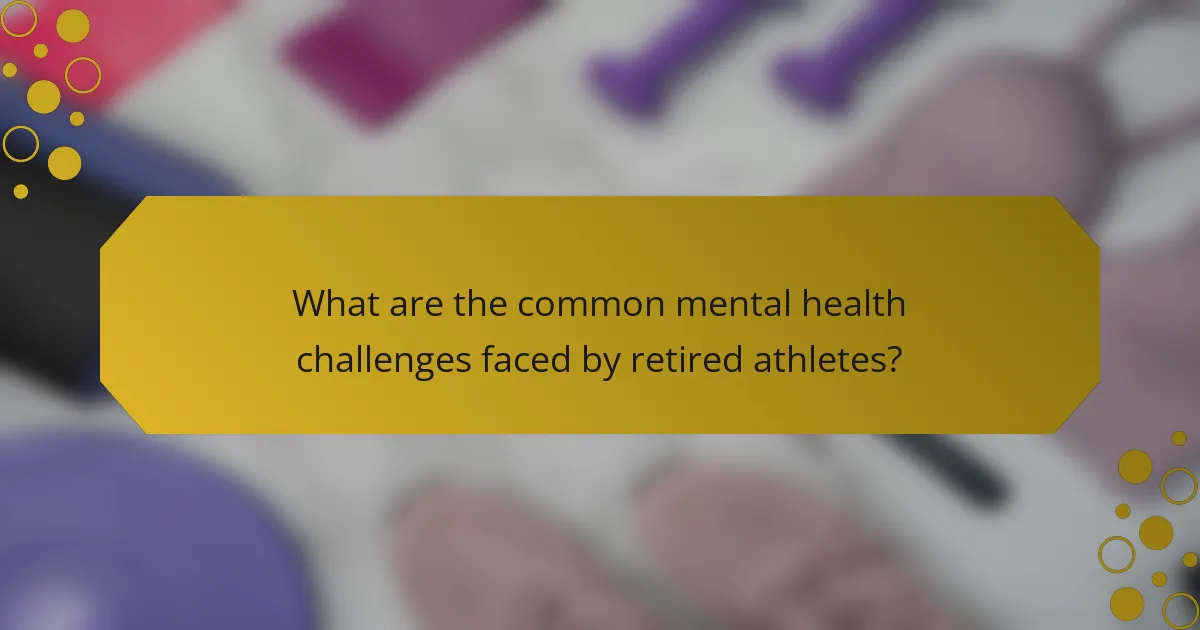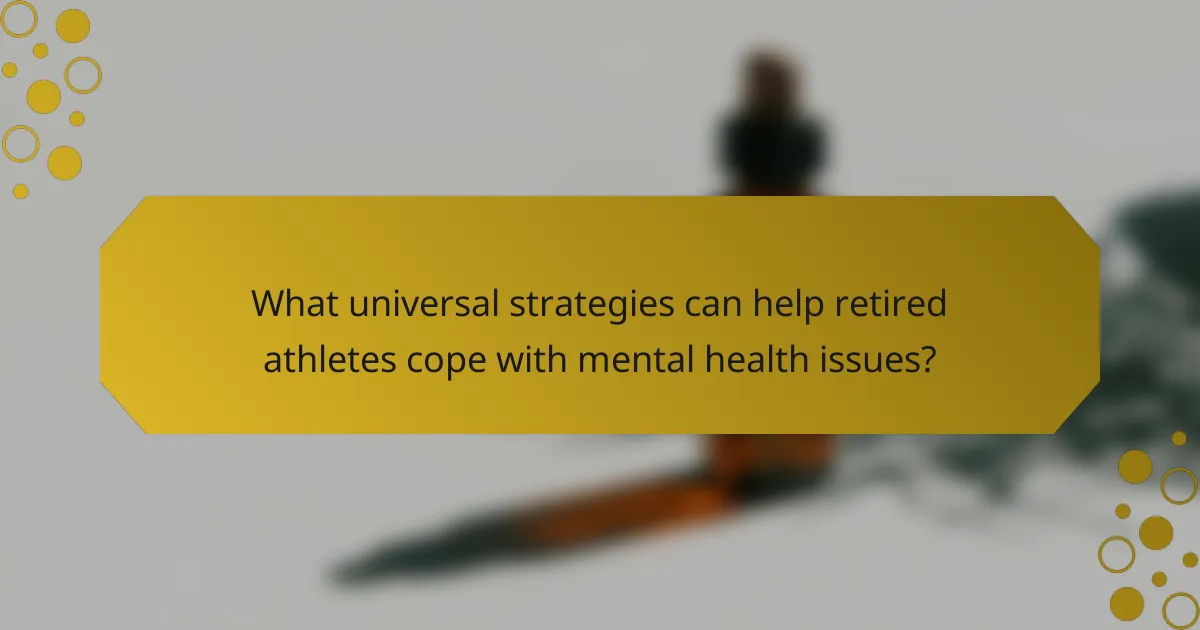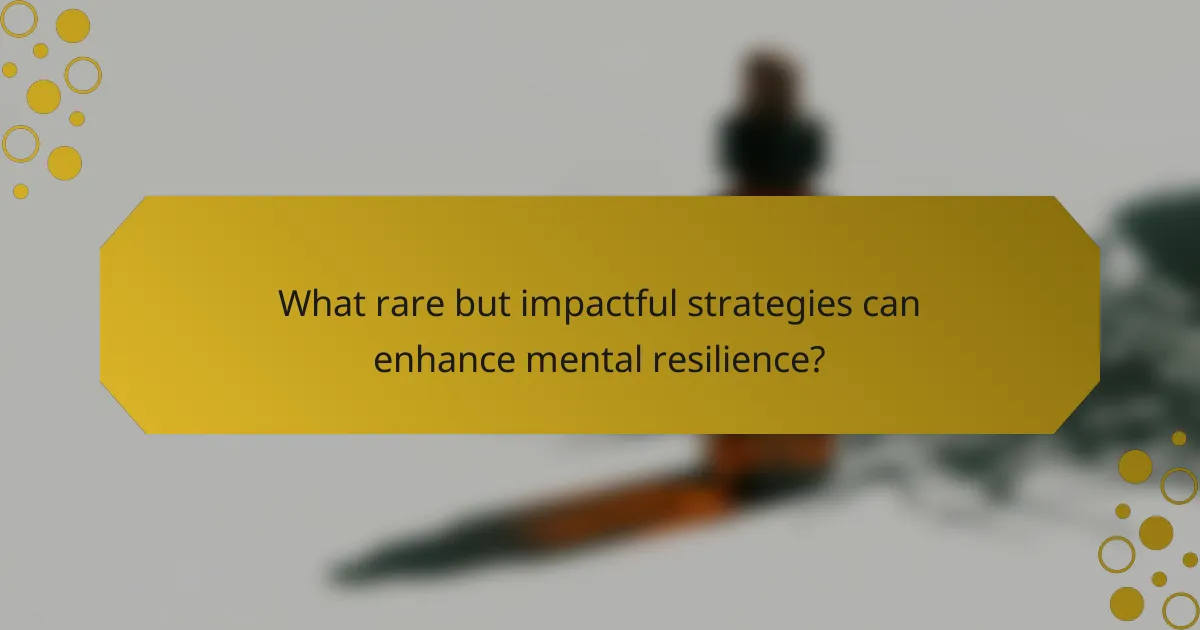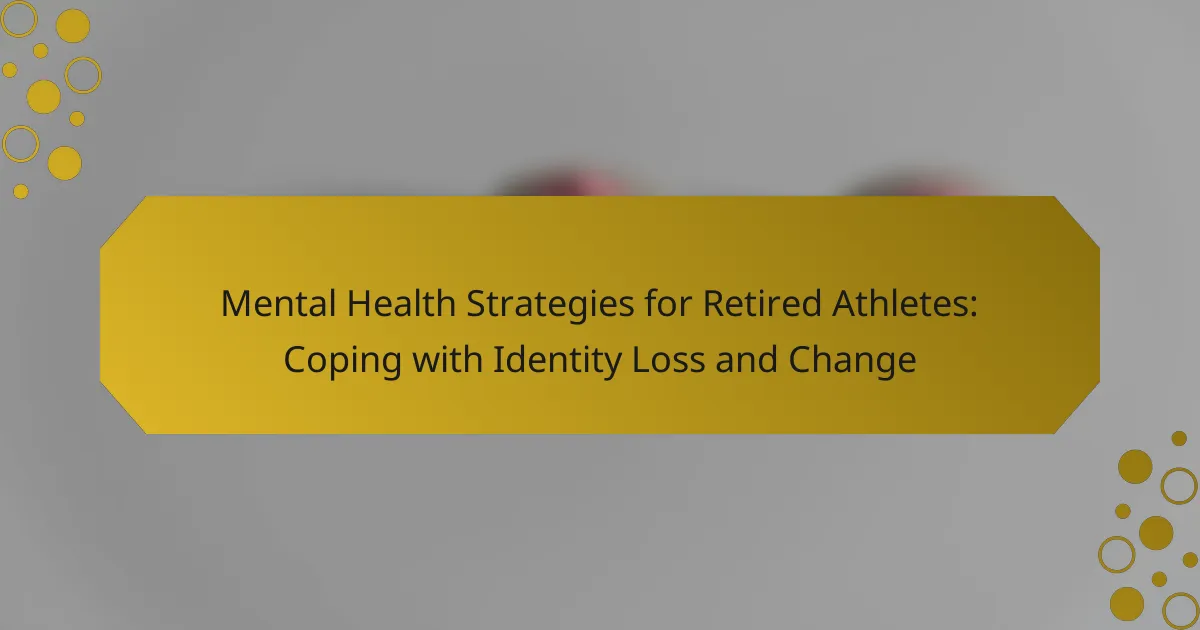Retired athletes often struggle with mental health challenges such as identity loss, depression, and social isolation. Effective coping strategies include building a supportive social network, engaging in new hobbies, and practicing mindfulness. Establishing new routines and seeking professional help can further aid in navigating this significant life transition. These approaches promote resilience and well-being, helping athletes redefine their identities beyond sports.

What are the common mental health challenges faced by retired athletes?
Retired athletes commonly face mental health challenges such as identity loss, depression, anxiety, and social isolation. Transitioning from a competitive sports career can disrupt their sense of purpose and self-worth. Many athletes struggle to redefine their identity outside of sports, leading to feelings of emptiness. Research indicates that up to 35% of retired athletes experience significant mental health issues, highlighting the need for effective coping strategies. Engaging in new activities, seeking support, and utilising mental health resources can help mitigate these challenges.
How does identity loss affect retired athletes?
Identity loss significantly impacts retired athletes, leading to mental health challenges such as depression and anxiety. This transition often disrupts their sense of self, as sports careers provide a strong identity. Many athletes experience feelings of emptiness and struggle to find new purposes. Strategies for coping include engaging in new hobbies, seeking therapy, and building supportive networks. These approaches help mitigate the emotional toll and facilitate a smoother adjustment to life after sports.
What role does social support play in mental health for retired athletes?
Social support significantly enhances mental health for retired athletes by providing emotional and practical assistance. This support helps mitigate feelings of isolation and identity loss post-retirement. Engaging with peers fosters a sense of belonging, which is crucial for emotional well-being. Studies indicate that strong social networks can reduce anxiety and depression among retirees, promoting healthier coping mechanisms. Additionally, unique attributes of social support, such as shared experiences in sports, create deeper connections that facilitate recovery and adjustment to life after athletics.
What types of social connections are most beneficial?
Strong social connections significantly enhance mental health for retired athletes. The most beneficial types include close friendships, supportive family ties, and community engagement.
Close friendships provide emotional support and shared experiences, helping to mitigate feelings of isolation. Supportive family ties foster a sense of belonging and stability, which are crucial during identity transitions. Community engagement, such as joining clubs or volunteering, offers purpose and helps maintain social networks.
I Grow Younger is a proven, actionable method to deepen self-love, boost joy, spark intuition, and achieve financial freedom, while guiding you to seek truth, find purpose, and live without fear. These connections not only combat loneliness but also promote resilience, making them essential for mental well-being post-retirement.
How does transitioning out of competitive sports impact mental well-being?
Transitioning out of competitive sports can significantly impact mental well-being, often leading to identity loss and emotional challenges. Retired athletes may experience feelings of emptiness or depression as they adjust to life beyond competition.
Coping strategies are essential for managing these changes. Engaging in new hobbies or interests can help build a new identity. Additionally, seeking support from fellow athletes or mental health professionals can provide valuable guidance during this transition.
Research indicates that maintaining social connections and focusing on physical activity can enhance mental health post-retirement. These approaches help mitigate feelings of isolation and promote a sense of purpose.
In conclusion, adapting to life after competitive sports requires proactive mental health strategies to cope with identity loss and change effectively.

What universal strategies can help retired athletes cope with mental health issues?
Retired athletes can effectively cope with mental health issues by embracing universal strategies. These strategies include building a supportive social network, engaging in new hobbies, practicing mindfulness, and seeking professional help when needed.
Creating a strong support system is essential. Friends, family, and fellow athletes can provide emotional support and understanding. Engaging in new hobbies helps to form a new identity outside of sports, fostering personal growth and fulfilment.
Mindfulness practices, such as meditation or yoga, can reduce anxiety and improve emotional regulation. Professional help, like therapy, offers tailored strategies to address identity loss and mental health challenges.
These strategies promote resilience and well-being, helping retired athletes navigate life transitions successfully.
What are effective emotional regulation techniques?
Effective emotional regulation techniques for retired athletes include mindfulness practices, cognitive restructuring, and deep breathing exercises. Mindfulness helps in staying present, reducing anxiety about identity loss. Cognitive restructuring allows athletes to challenge negative thoughts and reframe their experiences positively. Deep breathing exercises promote relaxation, aiding in stress management. Engaging in these techniques can foster resilience during transitions.
How can retired athletes build a new identity post-career?
Retired athletes can build a new identity post-career by embracing new interests and fostering social connections. Engaging in community activities provides a sense of belonging, while pursuing hobbies can reignite passion. Establishing a routine helps create structure, which is vital for mental health. Seeking professional support, such as therapy, can aid in processing identity loss. Developing new skills can enhance self-esteem and open doors to new opportunities. Exploring mentorship roles allows athletes to share their experiences, reinforcing their value beyond sports.
What importance does physical activity hold in mental health maintenance?
Physical activity is crucial for maintaining mental health, especially for retired athletes facing identity loss. Regular exercise releases endorphins, improving mood and reducing anxiety. Engaging in physical activity helps establish a new routine, fostering a sense of purpose and belonging. Studies show that active individuals report better mental well-being, highlighting the importance of movement in coping with life transitions.

What unique mental health strategies are tailored for retired athletes?
Retired athletes can benefit from unique mental health strategies that address identity loss and change. These strategies include establishing new routines, fostering social connections, engaging in therapy, and exploring new interests.
Establishing new routines helps create structure and purpose in daily life. Fostering social connections combats feelings of isolation, providing support from peers who understand the transition. Engaging in therapy offers professional guidance to navigate emotional challenges. Exploring new interests encourages personal growth and identity reconstruction beyond sports.
These tailored strategies address the unique challenges faced by retired athletes, promoting mental well-being and resilience during this significant life transition.
How can retired athletes leverage their competitive mindset for personal growth?
Retired athletes can leverage their competitive mindset for personal growth by setting new goals and embracing challenges. This mindset fosters resilience, enabling them to adapt to life changes. Engaging in activities like coaching or mentoring can provide a sense of purpose. Additionally, maintaining physical fitness through new sports can enhance mental well-being. Research shows that structured routines and goal-setting improve mental health in transitioning athletes.
What role does therapy play in supporting retired athletes?
Therapy plays a crucial role in supporting retired athletes by helping them navigate identity loss and emotional challenges. It provides a safe space for self-exploration and coping strategies. Therapy can address feelings of isolation, anxiety, and depression, which are common during the transition from active sports. Research indicates that cognitive-behavioral therapy (CBT) is particularly effective in fostering resilience and promoting mental well-being. Additionally, engaging in group therapy can enhance social connections and reduce feelings of loneliness. Overall, therapy equips retired athletes with tools to adapt to life after sports, ensuring a healthier mental state.

What rare but impactful strategies can enhance mental resilience?
Engaging in mindfulness practices can significantly enhance mental resilience for retired athletes facing identity loss. Strategies like meditation and deep breathing exercises help manage stress and promote emotional stability. Additionally, cognitive restructuring techniques allow individuals to reframe negative thoughts, fostering a positive mindset. Seeking social support through peer networks or therapy can also provide valuable perspectives and encouragement. These rare but impactful strategies empower athletes to navigate the challenges of transition more effectively.
How can storytelling and sharing experiences aid in mental health recovery?
Storytelling and sharing experiences can significantly aid in mental health recovery for retired athletes by fostering connection and understanding. Engaging in narratives allows individuals to process their emotions related to identity loss and change. Sharing personal stories creates a supportive environment, encouraging others to relate and find solace in shared challenges. This form of communication can enhance emotional resilience, reduce feelings of isolation, and promote healing through community support. Additionally, storytelling serves as a unique attribute, providing a therapeutic outlet that can lead to improved mental well-being and a renewed sense of purpose.
What innovative programs exist specifically for retired athletes?
Innovative programs for retired athletes focus on mental health support and identity transition. Initiatives like the “Athlete Transition Program” offer workshops on coping strategies and identity reconstruction. Additionally, “Mindfulness-Based Stress Reduction” programs help athletes manage anxiety and stress. Organizations, such as “The Professional Athletes Foundation,” provide resources for emotional well-being and career counseling. These programs address the unique challenges faced during retirement, promoting resilience and mental wellness.

What best practices can retired athletes implement for long-term mental health?
Retired athletes can implement several best practices for long-term mental health, focusing on coping with identity loss and change. Engaging in regular physical activity, such as walking or yoga, can enhance mood and reduce anxiety. Establishing a support network of friends, family, or fellow athletes fosters connection and reduces feelings of isolation. Pursuing new interests or hobbies helps create a sense of purpose beyond sports. Additionally, seeking professional mental health support when needed can provide valuable coping strategies. Mindfulness practices, including meditation, can improve emotional resilience.
What common mistakes should retired athletes avoid in their mental health journey?
Retired athletes should avoid neglecting their mental health, isolating themselves, and failing to seek support. Recognising identity loss is crucial, as it can lead to depression. Establishing new routines helps in coping with change. Engaging in community activities fosters connection and reduces feelings of loneliness.
How can retired athletes proactively seek help when needed?
Retired athletes can proactively seek help by reaching out to mental health professionals, joining support groups, and utilising online resources. These strategies foster community and provide essential coping mechanisms for identity loss and change. Seeking therapy can facilitate emotional processing, while peer support offers shared experiences. Regularly engaging in these practices can significantly enhance mental well-being.
What resources are available for ongoing support and development?
Retired athletes can access various resources for ongoing support and development, including counselling services, peer support groups, and workshops. These resources help address identity loss and promote mental well-being. Additionally, organisations like the Professional Athletes Foundation offer tailored programs that focus on life skills and career transitions. Engaging with community initiatives can also foster connections and provide a sense of belonging.
